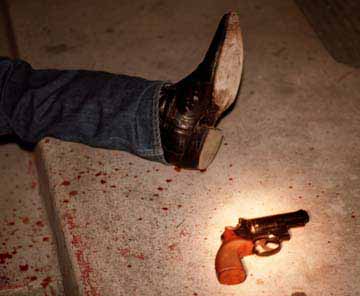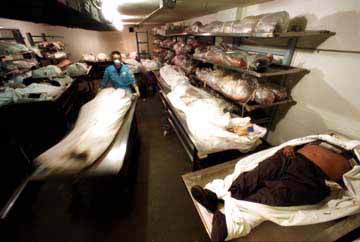THE SUICIDE OF OFFICER BAXTER SLATE

from "The Choirboys" by Joseph Wambaugh

"What is it, Catullus? Why do you not make haste to die?"
...There was speculation and many rumors in the parking lot about Baxter Slate's suicide, and several members of the Wilshire nightwatch spent a lingering fearful evening handling calls, cruising, smoking silently, trying to avoid thinking of that most terminal of all policeman's diseases. Wondering how one catches it and how one avoids it.
None of the choirboys took the initiative to do police work that night. It was as though a monotonous routine would be somehow comforting, reassuring. The only thing out of the ordinary done by a nightwatch radio car was that 7-A-29 drove to West Los Angeles Police Station, the area in which Baxter Slate had resided because he loved Westwood Village and the cultural activities at UCLA and the theater which showed foreign films and a small unpretentious French restaurant with wonderful wines.
"I'd like to see the homicide team. Whoever's handling Officer Slate's suicide," Sam Niles said to the lone detective in the squad room.
"All gone home, Officer. Can you come back tomorrow?"
The detective wasn't much older than Sam and like Sam he had a mustache. His suit coat was thrown over a chair. He wore an uncomfortable looking shoulder holster.
"I'd like to see the death report on Baxter Slate," Sam Niles said.
"I can't go into homicide's cases. Come back tomorrow. You can talk to..."
"Please," said Sam Niles. "I only want to see the report. Please."
And the detective was about to refuse, but he looked at Harold Bloomguard who turned and walked out of the office, and he looked as Sam Niles who did not walk away. He looked at Sam's face and asked, "Was he a friend?"
"Please let me see the report. I have to see it. I don't know why."
"Have a seat," the detective said and walked to a filing cabinet marked - "Suicides - 1974" and pulled out a manila folder, removed the pictures in the file which Sam Niles definitely did not want to see and gave the file to the choirboy.
Sam read the perfunctory death report which listed the landlady as the person discovering the body. The person hearing the shot was a neighbor, Mrs. Flynn. He saw that Baxter's mother who was in Hawaii has not been contacted as yet. His married sister in San Diego was the nearest relative notified. The speckled pup which Baxter had been caring for since he found her on the street outside Wilshire Station was taken to the animal shelter where she would soon be as dead as her master. The narrative told him nothing except that Baxter has fired one shot into his mouth at 11:00 A.M. that morning on a sunny smogless delightful day.
In the file was a note to the milkman which Baxter had written asking that two quarts of skim milk be left. The handwriting was scratchy, halting, not the sure flowing stroke of Baxter Slate. No more than that horrible grimace of consummate humiliation in Gina Summers apartment had been a Baxter Slate grin.
The report said that several books were scattered around the table where the body was found. Baxter Slate had gone to the classics at the end. Disjointedly. Desperately. The detective had torn several pages from the clothbound texts. He had thought the pages marked by that same spidery crawl might prove enlightening.
One marked passage from Socrates read: "No evil can happen to a good man, either in life or after death."
Another from Euripides said: "When good men die their goodness does not perish, but lives though they are gone. As for the bad, all that was theirs dies and is buried with them."
Baxter had marked a passage from Cicero, the only one not specifically mentioning good and evil and death. It made Sam Niles groan aloud which startled the nightwatch detective. It said: "He removes the greatest ornament of friendship who takes away from it respect."
Sam removed his glasses and cleaned them before reading the last page. The pages was powdery from dried blood. Sam's hands were shaking so badly the nightwatch detective was alarmed. Sam read it and left the squad room without thanking the detective for his help. The passage was underlined. It simply said: "What is it? Catullus? Why do you not make haste to die?"
"Men in Blue"
Why do some cops go beserk?
![]()